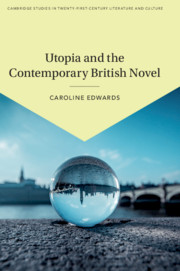Book contents
- Utopia and the Contemporary British Novel
- Cambridge Studies in Twenty-First-Century Literature and Culture
- Utopia and the Contemporary British Novel
- Copyright page
- Dedication
- Contents
- Acknowledgements
- Chapter 1 Introduction
- Chapter 2 Reading Fictions of the Not Yet
- Chapter 3 Death
- Chapter 4 Transmigration
- Chapter 5 Apocalypse
- Chapter 6 Epilogue
- Notes
- Bibliography
- Index
Chapter 4 - Transmigration
Networking Utopian Times
Published online by Cambridge University Press: 01 July 2019
- Utopia and the Contemporary British Novel
- Cambridge Studies in Twenty-First-Century Literature and Culture
- Utopia and the Contemporary British Novel
- Copyright page
- Dedication
- Contents
- Acknowledgements
- Chapter 1 Introduction
- Chapter 2 Reading Fictions of the Not Yet
- Chapter 3 Death
- Chapter 4 Transmigration
- Chapter 5 Apocalypse
- Chapter 6 Epilogue
- Notes
- Bibliography
- Index
Summary
This chapter employs the metaphor of the network as conceptual method, thinking about how to network together the disjunct times experienced by the individual subject into broader intersubjective and collective times. Hari Kunzru’s Gods Without Men (2011), David Mitchell’s Cloud Atlas (2004) and The Bone Clocks (2014), and Joanna Kavenna’s The Birth of Love (2010) employ the figures of the Internet, the political multitude and the transmigration of characters across various historical times in their formal experimentation with delinearised narrative structures, increasingly blurring the boundaries between the novel and the short story. Mediating between the subjective experience of lived time and history-in-totem, these novels offer a series of networked utopian ‘moments of possibility‘ that I argue contribute to political discussions of inoperative or de-essentialised community in the twenty-first century.
Keywords
- Type
- Chapter
- Information
- Utopia and the Contemporary British Novel , pp. 114 - 153Publisher: Cambridge University PressPrint publication year: 2019

